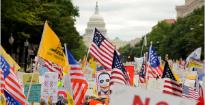Rauch: How the Tea Party Organizes
 Jonathan Rauch reports:
Jonathan Rauch reports:
Though headless, the tea party movement is not mindless. Its collective brain meets every Monday night.
More than 200 leaders of local tea parties -- coordinators, as they usually call themselves -- join a conference call every week organized by an umbrella group called the Tea Party Patriots, the largest national tea party organization. On one Monday recently, three national coordinators begin the session with a rundown on plans for upcoming rallies. The events are expensive; does anyone have a problem with a search for $1,000 donors? (No one does.) An organizer has put together a manual on what to ask candidates at town hall events. ("That will go to the entire e-mail list.")
The group is polled on whether to hold a second round of house parties throughout the country. (Yes.) A coordinator gives an update on an iPhone app for tea partiers who will be going door to door this fall to talk to voters. (It will use Global Positioning System technology to download walking lists and upload voter data in real time -- cutting-edge stuff.)
The floor is then opened. Local leaders propose ideas, announce new tea party groups, float queries, and offer tips. (How can we maximize free publicity? Lawn signs, movie events, and digiprint postcards are cheap and effective.) A newcomer introduces a start-up tea party in Winfield, Ind. A coordinator in nearby South Bend offers a welcome. ("I know all these folks. I want to get you connected with them.")
Rick, from Albuquerque, N.M., asks if the national agenda includes investigating voter-roll irregularities, something his group is concerned about. Mark Meckler, a Tea Party Patriots coordinator and co-founder, weighs in. Newcomers "often don't understand how badly we need you to lead the way," he says. "If this is an area of concern to you," he admonishes, "the way the Tea Party Patriots works is that you guys really lead the organization. We're a relatively small group of people who are just trying to help coordinate. We're not in charge; we're not telling anybody what to do. You need to take a leadership role and stand up." Meckler suggests that Rick gather a group of people concerned about the issue and go to work.
Rick gets the message. "We'll get on the Ning [social-networking] site and try to take the lead on that."
Will vote fraud emerge as a tea party cause? Maybe, maybe not. Meckler, the closest thing the movement has to an organizational visionary, meant what he said. No one gives orders: In the expansive dominion of the Tea Party Patriots, which extends to thousands of local groups and literally countless activists, people just do stuff, talk to each other, imitate success, and move the movement.
"Essentially what we're doing is crowd-sourcing," says Meckler, whose vocabulary betrays his background as a lawyer specializing in Internet law. "I use the term open-source politics. This is an open-source movement." Every day, anyone and everyone is modifying the code. "The movement as a whole is smart."
Can it work? In American politics, radical decentralization has never been tried on so large a scale. Tea party activists believe that their hivelike, "organized but not organized" (as one calls it) structure is their signal innovation and secret weapon, the key to outlasting and outmaneuvering traditional political organizations and interest groups. They intend to rewrite the rule book for political organizing, turning decades of established practice upside down. If they succeed, or even half succeed, the tea party's most important legacy may be organizational, not political.
Click here to read more.

